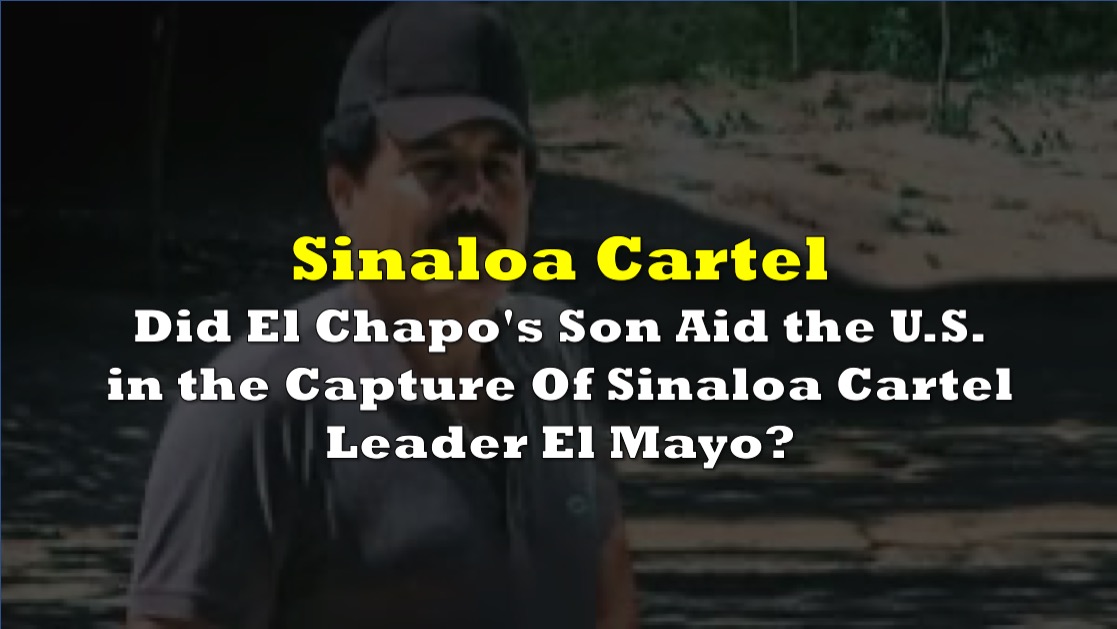In a significant blow to one of Mexico’s most notorious drug trafficking organizations, the US Federal Bureau of Investigation (FBI) has arrested two high-ranking members of the Sinaloa cartel, including Ismael “El Mayo” Zambada and Joaquin Guzman Lopez, son of Joaquin “El Chapo” Guzman. The arrests occurred in El Paso, Texas, on Thursday, federal authorities announced.
Attorney General Merrick Garland confirmed the arrests, stating, “The Justice Department has taken into custody two additional alleged leaders of the Sinaloa Cartel, one of the most violent and powerful drug trafficking organizations in the world.”
Ismael “El Mayo” Zambada, a long-time fugitive, and Joaquin Guzman Lopez were apprehended by the FBI near the U.S. border. “Zambada was taken into custody by the FBI without incident,” a senior official told CBS News. Both men face multiple charges in the U.S. related to their leadership roles in the cartel’s criminal operations, particularly their involvement in the fentanyl trade.
FBI Director Christopher Wray elaborated on the charges, saying, “Garcia and Guzman have allegedly overseen the trafficking of tens of thousands of pounds of drugs into the United States, along with related violence.”
The arrests come after Zambada, who has been a fugitive for many years, was tricked into flying to Texas by a high-ranking Sinaloa cartel member. He believed he was inspecting clandestine airfields in Mexico but was instead flown to El Paso, Texas, where he was taken into custody upon landing, according to Homeland Security Investigations (HSI) officials. Guzman Lopez was on the same plane and was also arrested.
Sinaloa cartel break?
Multiple sources suggest that Guzman Lopez may have assisted U.S. authorities in the capture of Zambada. According to those familiar with the operation, Guzman Lopez willingly turned himself in to U.S. authorities and cooperated in orchestrating Zambada’s capture. All Source News reported on social media, “Joaquín Guzmán López willingly turned himself in to US authorities. Mayo Zambada did not surrender but was captured. The implication of this: Joaquín Guzmán López assisted US authorities in capturing Mayo Zambada.”
Historically, the Sinaloa cartel has been known for its internal cohesion, largely due to the leadership of figures like “El Chapo” and Zambada. The potential internal betrayal by Guzman Lopez might spark distrust and power struggles among remaining leaders and members, destabilizing the organization.
So this is a major development from multiple anonymous sources: Joaquín Guzmán López willingly turned himself in to US authorities.
— All Source News (@All_Source_News) July 26, 2024
Mayo Zambada did not surrender but was captured.
The implication of this: Joaquín Guzmán López assisted US authorities in capturing Mayo Zambada
This marks a significant milestone for U.S. law enforcement, which has long targeted the Sinaloa cartel. The U.S. had offered a $15 million reward for information leading to Zambada’s arrest. DEA Administrator Anne Milgram emphasized the impact of Zambada’s capture, saying that the arrest of Zambada “strikes at the heart of the cartel that is responsible for the majority of drugs, including fentanyl and methamphetamine, killing Americans from coast to coast.”
The Sinaloa cartel, founded in the 1980s, has been one of Mexico’s most powerful and violent criminal organizations. After “El Chapo” Guzman’s capture in 2016, Zambada assumed leadership. El Chapo is currently serving a life sentence in a maximum-security U.S. prison on charges including drug trafficking and money laundering.
Guzman Lopez, one of El Chapo’s 12 children, has been heavily involved in the cartel’s operations along with his brothers, known collectively as “Los Chapitos.” First indicted on federal drug trafficking charges in 2018, Lopez faces numerous charges related to the cartel’s fentanyl operations.
The Justice Department has linked the cartel to the deaths of hundreds of thousands of Americans due to fentanyl overdoses. An indictment released last year accused the Chapitos of using extreme methods to torture their rivals, including corkscrews, electrocution, and hot chiles. Some victims were allegedly “fed dead or alive to tigers,” and fentanyl potency was tested on prisoners.
The recent arrest operation, months in the making, represents a collaborative effort between U.S. agencies. It follows the January 2023 arrest of Ovidio Guzman, another of El Chapo’s sons, who was later extradited to the U.S. The cartel’s lead hitman, Néstor Isidro “El Nini” Pérez Salas, was captured in November and extradited earlier this year.
Despite Zambada’s low profile, his influence in the cartel was significant. He was considered a stabilizing force in Culiacán, the capital of Sinaloa state, and maintained order against rival groups. Residents viewed him as a cartel elder who protected the city. Margarito Flores, a former pointman for Zambada and El Chapo, described Zambada as “very careful about security and didn’t use cellphones,” portraying him as a simple rancher.
Flores, now with Dynamic Police Training, warns that Zambada’s arrest may spark a wave of violence: “I think it’s the beginning of the end of what was once the most powerful criminal organization in the world.”
The U.S. Justice Department remains committed to combating the fentanyl crisis. “Fentanyl is the deadliest drug threat our country has ever faced, and the Justice Department will not rest until every single cartel leader, member, and associate responsible for poisoning our communities is held accountable,” said Garland.
Remember that scene at the end of "Narcos: Mexico" Season 2 when Walt visits Felix Gallardo in jail?
— Stanphyl Capital (@StanphylCap) July 26, 2024
"You’ll be drowning in blood, chaos. Now you’ll see what happens when the cage breaks open and all the animals run free. You’re going to miss me.”
What happens now? https://t.co/ABmAiqRY7f
Information for this briefing was found via The Wall Street Journal, CBS News, and the sources mentioned. The author has no securities or affiliations related to this organization. Not a recommendation to buy or sell. Always do additional research and consult a professional before purchasing a security. The author holds no licenses.




